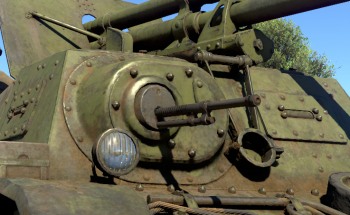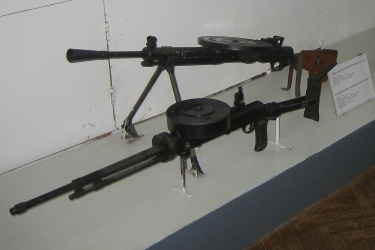Difference between revisions of "DT (7.62 mm)"
Inceptor57 (talk | contribs) (Added weapon history) |
Inceptor57 (talk | contribs) (→History: Added image of weapon) |
||
| Line 61: | Line 61: | ||
The DP machine gun would serve as the Red Army's infantry light machine gun from 1927 to throughout World War II, though the initial models had issues with bipod structural strength and the lack of a manual safety (only a grip safety was present).<ref name="Popenker_Degtyarov"/> Until World War II, the only considered modification of the DP machine gun was transforming the feed mechanism from the large pan-shaped magazine to a slimmer hopper-type based on experience against the Japanese and their [[Type 91 (6.5 mm)|Type 11 machine guns]] in 1938-1939; however the design change was dropped due to awkward handling and unsatisfactory reliability.<ref name="ForgottenWeapons_DPHopper">McCollum Mar. 2011</ref> Following experience from World War II battles, the DP machine gun underwent a modernization between 1943-1944 as the ''DPM'', which introduced a pistol grip, redesigned stock, a safe/fire selector, the repositioning of the recoil spring to the rear, and a stronger bipod.<ref name="ForgottenWeapons_DPvDT">McCollum Apr. 2011</ref> | The DP machine gun would serve as the Red Army's infantry light machine gun from 1927 to throughout World War II, though the initial models had issues with bipod structural strength and the lack of a manual safety (only a grip safety was present).<ref name="Popenker_Degtyarov"/> Until World War II, the only considered modification of the DP machine gun was transforming the feed mechanism from the large pan-shaped magazine to a slimmer hopper-type based on experience against the Japanese and their [[Type 91 (6.5 mm)|Type 11 machine guns]] in 1938-1939; however the design change was dropped due to awkward handling and unsatisfactory reliability.<ref name="ForgottenWeapons_DPHopper">McCollum Mar. 2011</ref> Following experience from World War II battles, the DP machine gun underwent a modernization between 1943-1944 as the ''DPM'', which introduced a pistol grip, redesigned stock, a safe/fire selector, the repositioning of the recoil spring to the rear, and a stronger bipod.<ref name="ForgottenWeapons_DPvDT">McCollum Apr. 2011</ref> | ||
| + | [[File:Machine gun DP and DT.jpg|x250px|thumb|right|A DP and DTM machine gun on display.]] | ||
The DP was also be used as vehicle mounts under the variations [[DA (7.62 mm)|DA]] for aircraft mounts, and '''DT''' and the modernized ''DTM'' for tank mounts. These variants were notable for their removed barrel shroud for a heavy barrel, different stock design (the DT would have a collapsible stock), and a redesigned magazine that was smaller in width, but taller in height to reduce the weapon's width for mounting within a constrained vehicle space.<ref name="Popenker_Degtyarov"/><ref name="ForgottenWeapons_DTM">McCollum 24 Jan. 2011</ref> | The DP was also be used as vehicle mounts under the variations [[DA (7.62 mm)|DA]] for aircraft mounts, and '''DT''' and the modernized ''DTM'' for tank mounts. These variants were notable for their removed barrel shroud for a heavy barrel, different stock design (the DT would have a collapsible stock), and a redesigned magazine that was smaller in width, but taller in height to reduce the weapon's width for mounting within a constrained vehicle space.<ref name="Popenker_Degtyarov"/><ref name="ForgottenWeapons_DTM">McCollum 24 Jan. 2011</ref> | ||
Revision as of 19:10, 29 March 2021
Contents
Description
The DT is a Russian light machine gun equipped on various vehicles, first put into combat in 1928.
Vehicles equipped with this weapon
| Vehicles equipped with this weapon | |
|---|---|
| Light tanks | |
| BT-5 | BT-5 · RBT-5 |
| BT-7 | BT-7 · BT-7 TD · BT-7A (F-32) · BT-7M |
| T-26 | T-26 · T-26 (1st Gv.T.Br.) · ␗T-26 · T-26 No.531 · T-26-4 · T-26E |
| Other | BA-11 · T-50 · T-60 · T-70 · T-80 · T-126 |
| Medium tanks | |
| T-28 | T-28 · T-28E · T-28 (1938) |
| T-34 | T-34 (Prototype) · T-34 (1941) · T-34-57 · T-34 (1st Gv.T.Br.) · T-34 (1940) · T-34 (1942) · ␗T-34 (1943) · ▀T 34 747 (r) · T-34E · T-34E STZ |
| T-34-57 | T-34-57 (1943) |
| T-34-85 | T-34-85 (D-5T) · ␗Т-34-85 (S-53) · T-34-85 · T-34-85 No.215 · T-34-85E · Т-34-85 Gai |
| T-34-100 | T-34-100 |
| T-44 | T-44 · T-44-100 · T-44-122 |
| Heavy tanks | |
| IS-2 | IS-2 · ␗IS-2 · IS-2 No.402 · IS-2 (1944) · IS-2 "Revenge" · ␗IS-2 (1944) |
| KV-1 | KV-1 (L-11) · KV-1 (ZiS-5) · KV-1E · KV-1S · ▀KV-IB |
| KV-2 | KV-2 (1940) · KV-2 (ZiS-6) · ▀KW II 754 (r) |
| Matilda | ▂MK-II "Matilda" |
| Other | IS-1 · IS-3 · IS-6 · KV-85 · KV-122 · KV-220 · T-35 |
| Tank destroyers | ZiS-30 |
General info
Tell us about the tactical and technical characteristics of the cannon or machine gun.
Available ammunition
Describe the shells that are available for the weapon and their features and purpose. If it concerns autocannons or machine guns, write about different ammo belts and what is inside (which types of shells).
Comparison with analogues
Give a comparative description of cannons/machine guns that have firepower equal to this weapon.
Usage in battles
Describe the cannon/machine gun in the game - its distinctive features, tactics of usage against notable opponents. Please don't write a "guide" - do not impose a single point of view, but give the reader food for thought.
Pros and cons
Summarise and briefly evaluate the weaponry in terms of its characteristics and combat effectiveness. Mark pros and cons as a list.
Pros:
Cons:
History
After World War I, the new Soviet government and its military sought to learn from their experience in World War I. The light machine guns were a particular type of weapons that were looked into, inspired by the Russian experience using the British Lewis machine gun. The Soviet military tasked Vasily Alekseyevich Degtyaryov with the job of designing a new light machine gun for the Red Army. The weapon Degtyaryov designed was a very simple design chambering the 7.62x54R mm cartridge, with six working parts needed for the machine gun's function. The weapon was also loaded by a pan-shaped magazine in a manner similar to the Lewis machine gun, a trait that Soviet soldiers would nickname the weapon as proigryvatel ("phonograph" or "record player").[1] Degtyaryov's weapon was adopted as the Red Army's newest light machine gun in 1927 as the DP machine gun.[2]
The DP machine gun would serve as the Red Army's infantry light machine gun from 1927 to throughout World War II, though the initial models had issues with bipod structural strength and the lack of a manual safety (only a grip safety was present).[2] Until World War II, the only considered modification of the DP machine gun was transforming the feed mechanism from the large pan-shaped magazine to a slimmer hopper-type based on experience against the Japanese and their Type 11 machine guns in 1938-1939; however the design change was dropped due to awkward handling and unsatisfactory reliability.[3] Following experience from World War II battles, the DP machine gun underwent a modernization between 1943-1944 as the DPM, which introduced a pistol grip, redesigned stock, a safe/fire selector, the repositioning of the recoil spring to the rear, and a stronger bipod.[4]
The DP was also be used as vehicle mounts under the variations DA for aircraft mounts, and DT and the modernized DTM for tank mounts. These variants were notable for their removed barrel shroud for a heavy barrel, different stock design (the DT would have a collapsible stock), and a redesigned magazine that was smaller in width, but taller in height to reduce the weapon's width for mounting within a constrained vehicle space.[2][5]
After World War II, the Soviet decide to replace the cumbersome pan-magazine on the DP with a belt-fed system. The DP machine gun was modified once again in 1946 with an add-on module that converts a DP to be able to take an ammunition belt from the SG-43/SGM machine gun.[6] This modification was adopted as the RP-46 (Rotnyj Pulemet (Company Machine Gun), 1946). The machine gun would remain in use in the Soviet military until supplemented by the universal PK machine gun.[2]
The DP and its variations sees wide-spread use in Soviet-aligned countries such as North Korea and China.[2][7]
Media
An excellent addition to the article would be a video guide, as well as screenshots from the game and photos.
See also
Links to the articles on the War Thunder Wiki that you think will be useful for the reader, for example:
- reference to the article about the variant of the cannon/machine gun;
- references to approximate analogues by other nations and research trees.
External links
- References
- Bibliography
- McCollum, Ian, "DP-28 vs DPM." Forgotten Weapons, 27 Apr. 2011, Website. Accessed 29 Mar. 2021.
- McCollum, Ian, "DTM Manual." Forgotten Weapons, 24 Jan. 2011, Website. Accessed 29 Mar. 2021.
- McCollum, Ian, "Kubynov hopper-fed DP28." Forgotten Weapons, 16 Mar. 2011, Website. Accessed 29 Mar. 2021.
- McCollum, Ian, "RP46 LMG." Forgotten Weapons, 10 Jan. 2011, Website. Accessed 29 Mar. 2021.
- McCollum, Ian, "RP46 Variations: Russian, North Korean, and US Reproduction." Forgotten Weapons, 04 Jul. 2018, Website. Accessed 29 Mar. 2021.
- Popenker, Maxim, "Degtyarov DP DPM RP-46." Modern Firearms, Website. Accessed 29 Mar. 2021.
- War Is Boring "The DP Machine Gun Looks Funny, But Spilled a Lot of Blood." Medium, A Medium Corporation, 23 Feb. 2016, Website. Accessed 29 Mar. 2021.
| Tank machine guns | |
|---|---|
| USA | |
| 7.62 mm | M37 · M60D · M73 · M240 · M1919A4 · Mk.52 |
| 12.7 mm | FN M3P · M2HB · M80 · M85 |
| Germany | |
| 5.56 mm | MG4 |
| 7.62 mm | C6 · MG3A1 |
| 7.92 mm | MG13 Dreyse · MG34 · MG37(t) · MG42 |
| 12.7 mm | S.MG.50 |
| USSR | |
| 7.62 mm | DT · PKMB · PKT · PKTM · RP-46 · SGMT |
| 12.7 mm | DK · DShK · 6P49 · NSVT |
| 14.5 mm | KPVT |
| Britain | |
| 7.62 mm | Browning MG4 · L3A1 · L8A1 · L8A2 · L37A1 · L37A2 · L94A1 |
| 7.7 mm | Vickers |
| 7.92 mm | BESA |
| 12.7 mm | L21A1 |
| Japan | |
| 6.5 mm | Type 91 |
| 7.62 mm | Type 74 |
| 7.7 mm | Type 97 |
| 12.7 mm | Type 60 (B) |
| China | |
| 5.8 mm | QJT |
| 7.62 mm | Type 55 · Type 59 · Type 86 |
| 12.7 mm | QJC88A · Type 54 |
| 14.5 mm | QJG02 |
| Italy | |
| 7.62 mm | Beretta MG42/59 · FN MAG 60-40 |
| 8 mm | 34/40M · Breda Mod. 38 |
| 13.2 mm | Breda Model 31 |
| France | |
| 7.5 mm | AAT-52 · MAC 31 |
| 7.62 mm | A-A-F1N |
| 8 mm | Hotchkiss Mle 1914 |
| Sweden | |
| 6.5 mm | ksp m/14-29 |
| 7.62 mm | ksp 39 C · ksp 58 · ksp 94 |
| 8 mm | ksp m/36 · ksp m/39B |
| 12.7 mm | ksp 88 |





